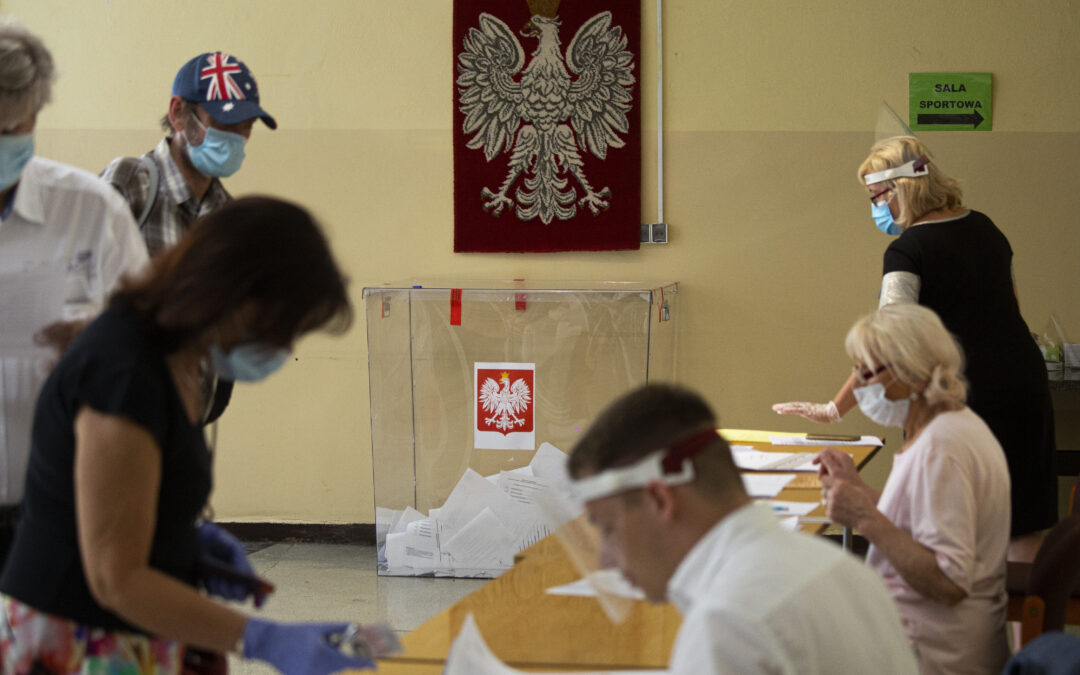Poland’s presidential election was administered professionally despite challenges created by the coronavirus pandemic, but the campaign was marred by intolerant rhetoric and bias from public media, says the Organization for Security and Co-operation in Europe (OSCE).
The OSCE’s election observers, whose findings were published today, also raised concern at the manner and haste with which the legislation enabling the election to take place was passed.
Incumbent president Andrzej Duda won yesterday’s first round of voting, but failed to secure the majority of votes needed for an outright victory. He will therefore head into a run-off vote against second-placed rival Rafał Trzaskowski on 12 July.
“We saw a first round that was professionally run even in these challenging times and in a sharply polarised political environment,” said Thomas Boserup, head of the special election assessment mission at the OSCE’s Office for Democratic Institutions and Human Rights (ODIHR).
The ODIHR noted that all official deadlines had been met, and that staff and voters in polling stations had consistently followed guidelines to use protective equipment.
However, it also noted that the electoral “campaign was characterised by intolerant rhetoric and a public broadcaster that failed in its duty to offer balanced and impartial coverage”.
“Instead, it acted as a campaign vehicle for the incumbent and frequently portrayed his main challenger as a threat to Polish values and national interests,” said ODIHR in its report. “Some of the reporting was charged with xenophobic and antisemitic undertones.”
The OSCE raised similar concerns about Poland’s public broadcasters after October’s parliamentary election, saying that a “lack of impartiality…undermined voters’ ability to make an informed choice…[and] amplified the advantage of the ruling party”.
Poland’s main state television station, TVP, is used by the ruling party to promote the government’s narrative and to attack its opponents. During the campaign, the main opposition candidate, Rafał Trzaskowski, sued TVP for its news reports about him.
The channel sought to portray Trzaskowski as working on behalf of a “powerful foreign lobby” linked to George Soros and the Bilderberg group, which TVP said was responsible for bringing Muslim immigrants to Europe. It also suggested that he wanted to allow Jews to “rob” Poland of “200 billion zloty” in restitution claims.
ODIHR noted that Duda himself had used “inflammatory language…with instances of xenophobic and homophobic rhetoric”. During the final stages of the campaign, Duda made a series of attacks on “LGBT ideology”, which he suggested was more dangerous than communism.
“It’s clear that emotions are running high, but intolerance or media bias can never be part of a truly vibrant democracy,” said Boserup, whose organisation noted that Trzaskowski’s campaign too had used “negative tactics”, thereby “further polarising an already confrontational environment”.
In its report, ODIHR also expressed concern that legislation regulating the election had been “adopted in haste and without adequate public debate, at odds with the commitments made by all countries of the OSCE region”.
After the originally scheduled 10 May election was abandoned, legislation was quickly pushed through to enable a new election on 28 June. The nature and timing of the changes, as well as the manner in which they were passed and implemented, have led to concerns that yesterday’s election did not conform to constitutional requirements.
The OSCE is an intergovernmental organisation with 57 member countries in Europe, Asia and North America. It takes a comprehensive approach to security that includes arms control and counter-terrorism, but also human rights, democratisation, media freedom and environmental activities.
Main image credit: Krzysztof Cwik / Agencja Gazeta

Daniel Tilles is editor-in-chief of Notes from Poland. He has written on Polish affairs for a wide range of publications, including Foreign Policy, POLITICO Europe, EUobserver and Dziennik Gazeta Prawna.




















